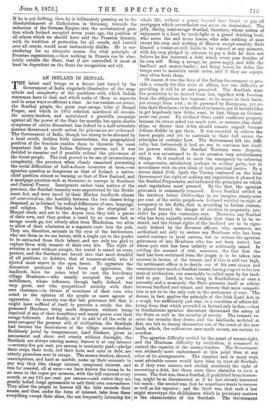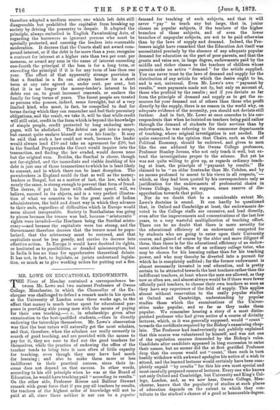AN IRELAND IN BENGAL. I whole life, without a penny
beyond bare bread, to pay off mortgages which nevertheless can never be diminished. The jolly, daring, semi-savage Sonthal, therefore, whose notion of I enjoyment is a hunt by torch-light or a grand drinking bout, who never lies and never learns, who asks nothing of man except his crop and nothing of Heaven except security, finds himself a tenant-at-will, liable to be starved at any moment, with his crop pledged in advance to pay a debt he does not believe he has incurred, a debt which every year doubles of its own self. Being a savage, he grows angry, and kills the landlord and money-lender ; and being brave, he defies the troops sent to maintain social order, and if they are sepoys, very often beats them.
Of course, it was the duty of the Indian Government to pro- vide a remedy for this state of affairs, but the difficulty of providing it will be at once perceived. The Sonthals want the protection to be derived from law, together with freedom from the obligations law imposes ; to be secure in their lands, yet exempt from rent ; to be governed by Europeans, yet re- tain their Headmen ; to be allowed to borrow, yet to be forbidden to get hopelessly into debts, want, in fact, things no Govern- ment can grant. No civilised State could confiscate property because its owner asked too much rent, or recreate clan chief- ships, or decree that debts should remain unpaid because debtors dislike to pay them. It was essential to relieve the forest people, and yet to maintain to their full extent the principles of ordinary Law. The Government felt the diffi- culty, but fortunately it had no one to convince but itself, its powers within the Sonthal Territory were despotic, and it was accustomed to do on occasion very revolutionary things. So it resolved to meet the emergency by enforcing a compromise, satisfactory perhaps to neither party, but in accordance with its own ideas of rude practical justice. By a decree dated 29th April, the Viceroy conferred on the local Government the right of making any regulations it pleased for the Sonthal Pergunnahs, and indicated the principles on which such regulations must proceed. By the first, the agrarian grievance is summarily removed. Every Sonthal settled in the territory before 1859—that is, we imagine, ninety-nine per cent, of the entire people—is declared entitled to right of occupancy in his fields, that is, according to Indian custom, is placed beyond the danger of eviction in perpetuity, pro- vided he pays the customary rent. Moreover, any Sonthal who has been unjustly evicted within that time is to be re- stored, and the future rights of the landlord are to be rigor- ously defined by the Revenue officers, who, moreover, are authorised not only to restore any Headman who has been ousted contrary to local custom, but to redress the agrarian grievances of any Headman who has not been ousted, but whose quit rent has been unfairly or arbitrarily raised. In settling the amount of rent, moreover, the fact that the land has been reclaimed from the jungle is to be taken into account in favour of the tenant, and if this is still too high, the settlement officer is to decide out of his own reason and conscience how much a Sonthal tenant, having respect to his low state of civilization, can reasonably be called upon by his land- lord to pay. Land, in fact, being in Sonthalistan at once a necessity and a monopoly, the State presents itself as arbiter between landlord and tenant, and decrees that mere competi- tion is not to be the only rule in the settlement of rent. The decree, in fact, applies the principle of the Irish Land Act, in a rough, but sufficiently just way, to a condition of affairs dif- fering from that which prevailed in Ireland only in this,—that in Sonthalistan agrarian discontent threatened the safety of the State as well as the security of society. The tenants re- ceive the security they desire, and the landlords, mulcted at first, are left to recoup themselves out of the rents of the new lands, which, the cultivators once made secure, are certain to overflow.
The agrarian difficulty settled by the grant of tenant-right, and the Headman difficulty by restitution, it remained to control the rapacity of the money-lenders. The Government was evidently more embarrassed at this point than at any other of its arrangements. The simplest and in many ways most advisable course would have been to treat all Sonthals as if they were minors, and abolish absolutely the right of recovering a debt, but there were three obstacles to such a course. The first was, that a Sonthal, if prohibited from borrow- ing, might be as discontented as if he had already borrowed too much ; the second was, that he sometimes wants to recover
as well as his superior ; and the third was, that such a law might stereotype the childishness which in pecuniary matters is the characteristic of the Sonthals. The Government therefore adopted a medium course, one which left debt still demand for teaching of such subjects, and that it will disagreeable but prohibited the capitalist from breaking up never " pay " to teach any but large, that is, junior society by driving the peasantry to despair. It adopted the classes on popular subjects, if the teachers of the higher principle, always embodied in English Pawnbroking Acts, of branches of those subjects, and of even the lower regarding the borrowers as ignorant persons who must be branches of unpopular subjects, are not to be paid otherwise specially protected, and coercing the lenders into reasonable than by the laws of supply and demand. Indeed, the Pro.. moderation. • It decrees that the Courts shall not award corn- fessors might have remarked that the Education Act itself was pound interest, or if the debt is for more than a year, recognise necessitated precisely by the absence of any adequate popular a contract for interest at a higher rate than two per cent. per demand for education on the part of poor parents, and that the mensem, or award any sum in the name of interest exceeding grants and rates are, in large degree, endowments paid by the one-fourth the principal if the loan is for a long term, or middle and richer classes to the teachers of children whose exceeding the principal if it is for any term of less than one parents make no active " demand " for the article supplied. year. The effect of that apparently strange provision is You can never trust to the laws of demand and supply for the that a Sonthal in a fix can always borrow for a short distribution of any article for which the desire ought to be, term at any rate agreed on, under cent. per cent., but and is not, universal. Even Mr. Lowe's own "payment by that it is no longer the money-lender's interest to let results," were payments made not by, but only on account of, debts run on, to grant incessant renewals, or enslave the those who profited by the results ; and if you deviate so far family for long terms of years. The forest people are treated from the principle of demand and supply as to get the re- as persons who possess, indeed, some foresight, but of a very sources for your demand out of others than those who profit limited kind, who must, in fact, be compelled to deal for directly by the supply, there is no reason in the world why, on terms during which they can remember and feel their pecuniary adequate evidence of the necessity, you should not deviate still obligations, and the result, we take it, will be that while credit further. And in fact, Mr. Lowe at once concedes to his cot- will still exist, credit in the form which is beyond the knowledge respondents that when he insisted on teachers being paid rather of simple people, credit protected by long enduring mort- through the demand of students for their services than by gages, will be abolished. The debtor can get into a scrape, endowments, he was referring to the commoner departments but cannot quite enslave himself or ruin his family. It may of teaching, where original investigation is not needed. He be said that such a law could not work, because the lender quite concurred in the opinion that Chairs, such as those of would always lend £10 and take an agreement for £20, but Political Economy, should be endowed, and given to men in the Sonthal Pergunnahs the Court would inquire into the like the one adduced by the Owens College professors, transaction, and finding the law evaded, would decree none Professor Stanley Jevons, who not only teach it well, but ex- but the original sum. Besides, the Sonthal is clever, though tend the investigations proper to the science. But yet he not far-sighted, and the immediate and visible doubling of his was not quite willing to give up, as regards ordinary teach- debt is just one of those transactions to which he is least likely ing at least, the principle of "payment by results." He to consent, and in which there can be least deception. The claimed to be "an older freetrader than Mr. Cobden, and by pawnbrokers :n England could do that as well as the money- no means professed to assent to his views in all respects,"— lenders m Bengal, but as a matter of fact, the law, which is which, as they had been quoted by his correspondents only as nearly the same, is strong enough to prevent that form of fraud. justification for the endowments of professorial chairs in The decree, if put in force with sufficient speed, will, we Owens College, implies, we suppose, some reserve of dis- believe, succeed in its objects, and is a very perfect illustra- approbation towards that policy.



































 Previous page
Previous page